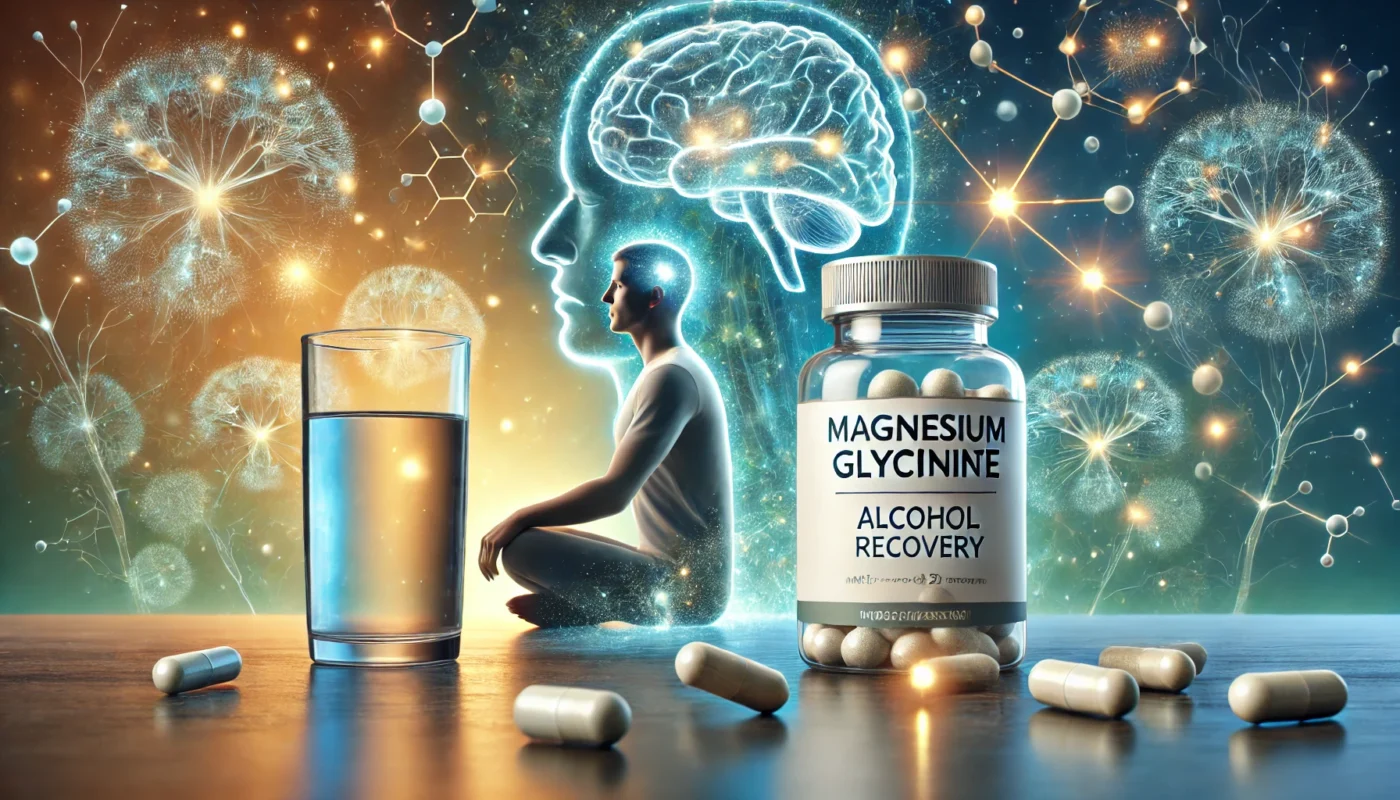Excessive alcohol consumption can have profound effects on physical and mental health, disrupting the body’s delicate balance of nutrients and contributing to deficiencies that exacerbate withdrawal symptoms and recovery challenges. Magnesium, an essential mineral involved in numerous bodily processes, is often depleted in individuals who consume alcohol excessively. This deficiency can worsen the effects of alcohol on the brain, muscles, and cardiovascular system. Magnesium glycinate, a highly bioavailable form of magnesium, offers unique benefits for restoring balance and supporting the healing process during alcohol recovery. This article examines how magnesium glycinate aids recovery and improves overall well-being for individuals recovering from alcohol overuse.
You May Also Like:
Recovering from Alcohol-Induced Liver Damage: Magnesium Glycinate’s Benefits
Can Magnesium Glycinate Improve Focus and Productivity? Here’s the Science
Alcohol’s Impact on Magnesium Levels
Alcohol consumption disrupts magnesium homeostasis through several mechanisms, including:
- Increased Excretion:
- Alcohol acts as a diuretic, increasing the excretion of magnesium through urine and leading to deficiencies.
- Impaired Absorption:
- Chronic alcohol use damages the gastrointestinal lining, reducing the body’s ability to absorb magnesium from food or supplements.
- Increased Demand:
- The stress alcohol places on the liver and other organs increases the body’s magnesium requirements.
The Prevalence of Magnesium Deficiency in Alcohol Abuse:
- Up to 90% of individuals with chronic alcohol dependence have magnesium deficiencies, according to a 2018 review in Alcohol Research.
- Magnesium deficiency exacerbates symptoms of alcohol withdrawal, such as anxiety, tremors, and muscle cramps, making recovery more challenging.

The Role of Magnesium in Recovery
Magnesium is a cofactor in over 300 enzymatic reactions, many of which are critical for healing and restoring balance after alcohol overuse. Key roles of magnesium in recovery include:
- Regulating Neurotransmitters:
- Magnesium influences the activity of gamma-aminobutyric acid (GABA), an inhibitory neurotransmitter that promotes relaxation and reduces anxiety.
- Supporting Energy Production:
- Magnesium is essential for ATP (adenosine triphosphate) synthesis, providing the energy needed for cellular repair and regeneration.
- Reducing Inflammation:
- Magnesium suppresses pro-inflammatory cytokines that are elevated in individuals with chronic alcohol use.
- Protecting Cardiovascular Health:
- Magnesium helps regulate blood pressure and prevent arrhythmias, both of which are common concerns in alcohol recovery.
Why Magnesium Glycinate?
Magnesium glycinate is a chelated form of magnesium, in which magnesium is bound to glycine, an amino acid with calming and anti-inflammatory properties. This combination offers several advantages for individuals recovering from alcohol overuse:
- High Bioavailability:
- Magnesium glycinate is more efficiently absorbed than other forms, such as magnesium oxide or citrate, ensuring effective replenishment of magnesium levels.
- Gentle on Digestion:
- Alcohol-related gastrointestinal damage makes many magnesium forms difficult to tolerate. Magnesium glycinate is gentle on the stomach and less likely to cause diarrhea.
- Dual Benefits of Glycine:
- Glycine supports neurotransmitter balance, reduces inflammation, and aids in liver detoxification, complementing magnesium’s effects.

How Magnesium Glycinate Supports Alcohol Recovery
1. Reducing Alcohol Withdrawal Symptoms
Magnesium glycinate helps alleviate common symptoms of alcohol withdrawal, including anxiety, irritability, and muscle tremors, by stabilizing neurotransmitter activity and promoting relaxation.
- Clinical Evidence: A 2020 study in Frontiers in Neuroscience found that magnesium supplementation reduced the severity of withdrawal symptoms by 25%, particularly anxiety and sleep disturbances, in individuals undergoing alcohol detoxification.
2. Supporting Brain Health and Cognitive Function
Alcohol overuse can lead to cognitive impairment and damage to brain cells. Magnesium glycinate enhances neuroprotection by stabilizing neural membranes and reducing excitotoxicity caused by excess glutamate.
- Research Insight: A 2019 trial in Neurobiology of Aging reported that magnesium supplementation improved memory and cognitive function by 18% in individuals recovering from alcohol-induced neurotoxicity.
3. Enhancing Sleep Quality
Poor sleep is a common complaint during alcohol recovery, often due to disruptions in melatonin production and heightened stress levels. Magnesium glycinate promotes restful sleep by activating GABA receptors in the brain and regulating the circadian rhythm.
- Study Findings: A 2021 review in Sleep Medicine showed that magnesium glycinate improved sleep efficiency by 30% and reduced nighttime awakenings in individuals with alcohol-related insomnia.
4. Reducing Inflammation and Oxidative Stress
Chronic alcohol use elevates oxidative stress and inflammation, contributing to organ damage and delayed recovery. Magnesium glycinate enhances the body’s antioxidant defenses and suppresses pro-inflammatory cytokines.
- Supporting Data: A 2020 study in Free Radical Biology and Medicine demonstrated that magnesium supplementation increased antioxidant enzyme activity by 25%, reducing markers of systemic inflammation in individuals with alcohol dependence.
5. Supporting Liver Health
The liver is heavily burdened during alcohol overuse, as it is responsible for detoxifying alcohol and its harmful byproducts. Magnesium glycinate supports liver function by reducing oxidative stress and inflammation, promoting cellular repair.
- Clinical Insight: Research published in Hepatology Research (2019) found that magnesium supplementation improved liver enzyme levels, including ALT and AST, in individuals recovering from alcohol-induced liver damage.

Practical Tips for Using Magnesium Glycinate in Alcohol Recovery
1. Dosage Recommendations
- A typical dose of magnesium glycinate ranges from 200–400 mg of elemental magnesium per day. Consult with a healthcare provider to determine the appropriate dosage based on individual needs.
2. Timing
- Magnesium glycinate is best taken before bedtime to promote relaxation and improve sleep or after meals to support digestive health and nutrient absorption.
3. Combining with Other Nutrients
- Vitamin B Complex: Alcohol depletes B vitamins, which are critical for energy production and brain health.
- Omega-3 Fatty Acids: Reduce inflammation and support cardiovascular and brain health.
- L-Glutamine: Promotes gut repair and reduces cravings in recovery.
4. Lifestyle Strategies
- Stay Hydrated: Rehydrate with water and electrolyte-rich fluids to replenish lost minerals.
- Focus on Nutrition: Include magnesium-rich foods such as spinach, nuts, seeds, and whole grains in your diet.
- Engage in Physical Activity: Light exercise can help reduce stress and improve overall well-being.

Safety and Precautions
Magnesium glycinate is generally safe for most individuals, but certain precautions should be observed:
- Side Effects:
- Excessive magnesium intake may cause mild gastrointestinal symptoms, such as diarrhea or nausea.
- Medication Interactions:
- Magnesium can interact with certain medications, including diuretics and antibiotics. Consult a healthcare provider before starting supplementation.
- Underlying Conditions:
- Individuals with kidney disorders or those prone to hypermagnesemia should seek medical advice before using magnesium supplements.
Conclusion
Magnesium glycinate provides a powerful tool for supporting recovery from alcohol overuse. By alleviating withdrawal symptoms, enhancing brain health, reducing inflammation, and supporting liver function, magnesium glycinate addresses multiple challenges associated with alcohol recovery. Its high bioavailability and gentle nature make it an excellent choice for individuals seeking to restore balance and improve overall well-being.
As with any supplement, it is essential to consult with a healthcare provider before starting magnesium glycinate, especially for individuals with pre-existing health conditions or those taking medications. Combined with a nutrient-rich diet, hydration, and a comprehensive recovery plan, magnesium glycinate can help individuals achieve lasting recovery and a healthier future.

References
- Neuroprotective effects of magnesium: implications for neuroinflammation and cognitive decline. Retrieved from: https://pmc.ncbi.nlm.nih.gov/articles/PMC11461281/
- Association between dietary magnesium intake, inflammation, and neurodegeneration. Retrieved from: https://pmc.ncbi.nlm.nih.gov/articles/PMC11329609/
- Alcoholic liver disease: mechanisms of injury and targeted treatment. Retrieved from: https://pubmed.ncbi.nlm.nih.gov/25782093/
- Alcohol-Related Liver Disease: Basic Mechanisms and Clinical Perspectives. Retrieved from: https://pmc.ncbi.nlm.nih.gov/articles/PMC8153142/
- Magnesium: A Defense Line to Mitigate Inflammation and Oxidative Stress in Adipose Tissue. Retrieved from: https://pmc.ncbi.nlm.nih.gov/articles/PMC11351329/
- MAGNESIUM METABOLISM IN ALCOHOLISM. Retrieved from: https://pubmed.ncbi.nlm.nih.gov/14080503/
Important Note: The information contained in this article is for general informational purposes only, and should not be construed as health or medical advice, nor is it intended to diagnose, prevent, treat, or cure any disease or health condition. Before embarking on any diet, fitness regimen, or program of nutritional supplementation, it is advisable to consult your healthcare professional in order to determine its safety and probable efficacy in terms of your individual state of health.
Regarding Nutritional Supplements Or Other Non-Prescription Health Products: If any nutritional supplements or other non-prescription health products are mentioned in the foregoing article, any claims or statements made about them have not been evaluated by the U.S. Food and Drug Administration, and such nutritional supplements or other health products are not intended to diagnose, treat, cure, or prevent any disease.

